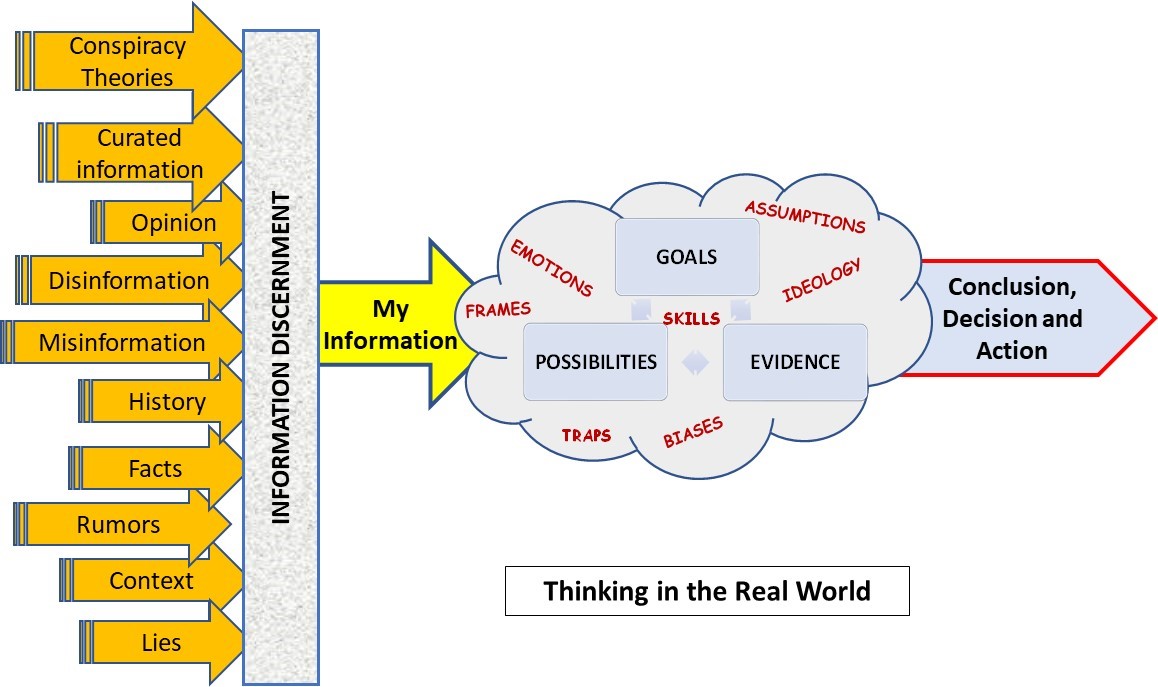What’s the quality of your thinking?
The future is going to be increasingly complex, contentious, and “wicked.” (Note: Wicked environments exist where the rules of the game are often unclear, feedback is spotty at best, and patterns are lacking or not obvious. It’s a condition of a system, not a commentary on morals.)
We need great thinkers to deal with the challenges of the future. Will we be up to these challenges? Are we losing our ability to think deeply about the issues? Or are we turning to ideology, social media, AI, and “influencers” for ready-made answers?
Thinking
Here’s a good starting place for the conversation.
“…thinking consists of search and inference. …. We search for three kinds of objects: possibilities, evidence, and goals. … Possibilities are possible answers to the original question, possible resolutions of the original doubt. … Goals are the criteria by which you evaluate the possibilities. … Evidence consists of any belief or potential belief that helps you determine the extent to which a possibility achieves some goal.”
Thinking and Deciding, Jonathon Baron, 1988
And inference (aka judgement) is the evaluation of the possibilities with respect to the evidence and goals.
All you have to do is identify your challenges and then search for possibilities, evidence, and goals. Oh, and then judge them.
Easy, right?
But what happens when:
- Search is replaced with political ideology, and we exclude anything that is not aligned with our beliefs.
- Evidence is whatever you read on the first page of Google results or whatever your personal influencer tells you.
- Goals are short-term and ignore the larger context.
- Judgement is left to the “influencers” in your life. They tell you what to believe.
- You ask a question of ChatGPT that is outside your field of expertise?
- You focus on easy answers, not deep and difficult questions.
In short, bad thinking is often the result of an inferior, incomplete, or broken search and inference process.
Thinking in the real world
Take the nice and neat explanation of thinking out of the textbook and place it in the real world.
Consider some of the deep thinking we should engage in as we deal with some of today’s issues and challenges.
- Teach honest history while dealing with an era of perceived micro-aggressions.
- Show respect for all life while some believe in the right to an abortion.
- Reduce mass shootings considering the Second Amendment.
- Blend shareholder value and stakeholder value.
- And there’s much more ……..
You might get a picture like the following.
How do you discern the information you’re using? How do you evaluate your own thinking?
Maybe you should study the work of a dead professor.
Richard Paul: characteristics of good thinking
The late Richard Paul was a prominent scholar in the field of critical thinking. In his research and writing he identified eight characteristics of good thinking, which are:
- Clarity: The ability to express ideas clearly and logically. Do you know and can you explain the goal of your thinking? Can you define the root issue?
- Accuracy: The ability to judge and analyze information correctly. Do you accept everything you find “on the web?”
- Precision: The ability to be specific and exact in reasoning and communication. Are your possibilities understandable to all your stakeholders?
- Relevance: The ability to connect ideas and information to the task at hand. Are you solving a problem or defending your favorite answer?
- Depth: The ability to analyze information thoroughly, including considering its complexity, significance, and context. Are you taking enough time to really understand the challenge?
- Breadth: The ability to consider information from multiple perspectives, including differing viewpoints and contexts. Who disagrees with your conclusion and why? Do you even listen to them?
- Logic: The ability to use sound reasoning and avoid logical fallacies. Do you reason through your challenges or rely on influencers for the answer? Do you know the common traps and watch for them?
- Fairness: The ability to consider multiple viewpoints and avoid bias or unfairness. Does your ideology let you listen to dissenting points of view? All of us have biases. Do you recognize yours?
See what happens when you apply these characteristics to the issues and challenges I mentioned above.
Next time
Should all of us be skeptics? The answer is yes. More about that in the next issue.
A favor, again
I’d like to grow the readership of MindPrep: Transforming Business Thinking.
Please pass this on to friends and colleagues. They can get on the list HERE. We don’t share our email list and they can unsubscribe if they don’t find value (and maybe a bit of entertainment) in our issues.
Cheers,
Bill
Never miss out!
Get an email update every time I publish new content. Be the first to know!

